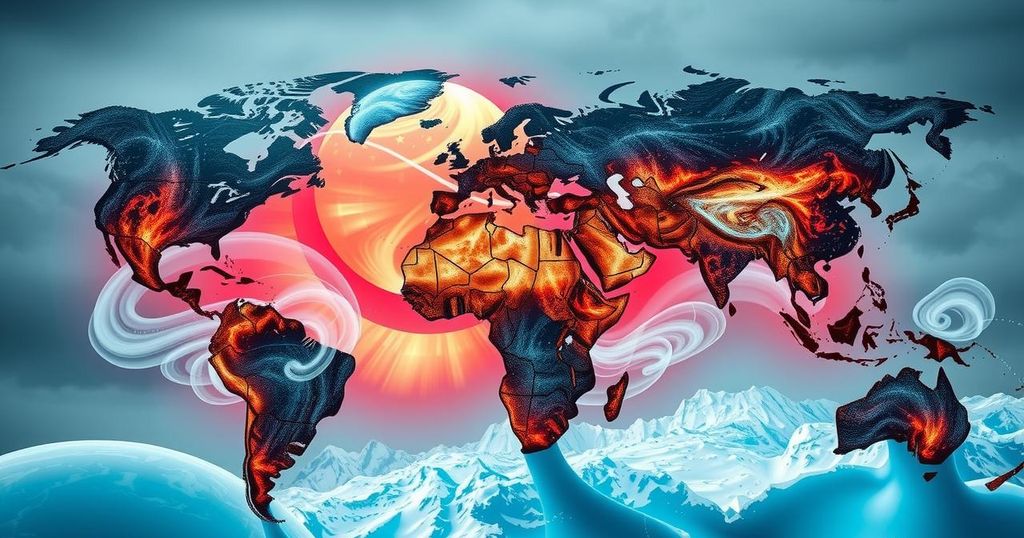2024 is expected to be the hottest year on record, following a decade of extreme heat attributed to human activities. The WMO reported that greenhouse gas levels are at an all-time high, leading to significant climate impacts, including increased extreme weather events and human casualties. Urgent action is needed to reduce emissions and transition to renewable energy, as emphasized by UN and WMO leadership, highlighting a global responsibility to tackle climate change effectively.
The year 2024 is projected to be the hottest on record, following a decade marked by unprecedented heat driven by human activities, as reported by the World Meteorological Organization (WMO). Levels of greenhouse gases have reached alarming highs, consequently trapping more heat in the atmosphere. UN Secretary-General António Guterres stressed the severity of the situation, noting that all ten of the warmest years on record occurred within the last decade.
Guterres stated, “Today I can officially report that we have just endured a decade of deadly heat. This is climate breakdown — in real time. We must exit this road to ruin — and we have no time to lose.” He called for substantial reductions in emissions by 2025 to pave the way for a more sustainable future. The WMO is anticipated to release the global temperature data for 2024 in January and its comprehensive climate report in March 2025.
Celeste Saulo, the Secretary-General of WMO, emphasized the pressing nature of climate action, as 2025 marks their 75th anniversary. She stated, “Every fraction of a degree of warming matters,” emphasizing that climate change manifests as increased extreme weather events globally. This year’s extreme weather included record rainfall, flooding, and severe cyclones, which took a significant toll on population and infrastructure.
The report highlights that climate change exacerbated 26 out of 29 analyzed weather events, resulting in over 3,700 fatalities and the displacement of millions. In particular, a study revealed that climate change contributed to an additional 41 days of dangerous heat in 2024, adversely affecting public health and ecosystems.
In response to these challenges, there has been a push for greater international collaboration to address the risks posed by extreme heat. A congress of experts from numerous nations addressed the urgent need for strategic responses to mitigate these dangers. Projects such as the Early Warnings for All initiative and the Global Greenhouse Gas Watch have been implemented as part of WMO’s ongoing commitment to climate adaptation and mitigation.
Additionally, the forthcoming International Year of Glaciers’ Preservation focuses on understanding and safeguarding the cryosphere as it is essential in tracking climate health. As 2024 concludes, multiple reports from the WMO illuminate the rapid pace of climate change and its significant implications for sustainability and human welfare.
In recent years, the effects of climate change have become increasingly evident, with 2024 expected to emphasize this trend more than ever. The World Meteorological Organization has been at the forefront of measuring these changes and advocating for urgent action to mitigate effects through robust climate strategies. This article extracts critical insights from the WMO’s findings, highlighting the reality of climate breakdown as acknowledged by leading figures in the organization and the United Nations, including António Guterres and Celeste Saulo. Understanding these insights helps frame the global narrative around climate responsibility and action in the present context.
In conclusion, 2024 is poised to be a pivotal year in the history of climate change as it is predicted to be the hottest year recorded to date. The alarming data on rising temperatures and extreme weather events calls for immediate and collective action from nations worldwide. Emphasizing the need for a global commitment to reduce emissions and invest in renewable energy sources, the WMO and UN officials highlight that the time for action is now. Their continued focus on climate science and international cooperation is essential for safeguarding the planet’s future, particularly in light of increasingly severe climate phenomena.
Original Source: wmo.int






